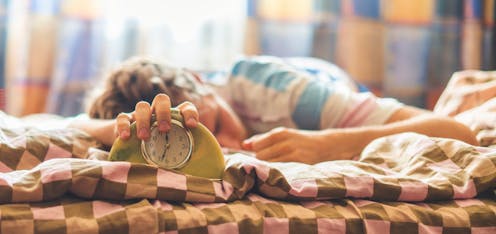Daylight saving is not something for economists to lose sleep over
- Written by Jayanta Sarkar, Senior Lecturer, Economics and Finance, Queensland University of Technology

Have you ever noticed that casinos don’t have clocks or windows?
That’s partly to encourage customers to lose track of time. Their owners have instinctively understood – long before this recent neuroscience study[1] confirmed it – that sleep-deprived people tend to take more risks.
We have a wealth of knowledge from laboratory studies about what sleep loss does to mood, behaviour and our ability to think and work.
We get a taste of it when we travel across time zones, work night shifts or pull all-nighters before exams.
Read more: Daylight saving: why changing SA's clocks could make us sleepy and accident-prone[2]
But what do we know about the real-life effects of the one hour of sleep loss that most of us experience on the same weekend each year due to daylight saving?
Spring forward
On the first Sunday of October, at 2am, clocks in NSW, Victoria, Tasmania, South Australia and the Australian Capital Territory spring forward an hour. People in those states are forced to get up earlier than they are used to.
Our cycle of sleep and waking is called our circadian rhythm – from the Latin circa (about) and dies (day). It is controlled by a tiny region in the hypothalamus of our brains that also regulates our hormone production, digestive function, electrolyte levels, body temperature and resting heart rate.
Read more: 100 years later, the madness of daylight saving time endures[3]
Jumping forward an hour means that, to start with, these things happen when we don’t want them to. It’s a bit like mild jet lag. Jumping forward at the beginning of daylight saving is worse than slipping back at the end, because it also eats into our sleep.
More risks
Many experts[4] attribute accidents (such as the crash of American Airlines Flight 1420, the explosions of the space shuttle Challenger and the Chernobyl nuclear power plant, and the Exxon Valdez oil spill) to human error caused by lost sleep.
It can also affect our normal approach to “economic risks”.
A “daylight saving anomaly” has been described in international financial markets. According to a well-known study[5] published in 2000, stock market returns were negatively affected in the weeks after both the change to and from daylight saving time. “In the United States alone,” they concluded, “the daylight saving effect implies a one-day loss of $31 billion on the NYSE, AMEX and NASDAQ indexes.”
The neuroscience study[6] mentioned above provides the first solid evidence that sleep deprivation makes gambling more tempting. This supports a previous finding that people with disturbed sleep are more likely to be problem gamblers[7].
Another study[8] finds that sleep deprivation accentuates the tendency to take risks in pursuit of potential gains but to be even more risk-averse when faced with potential losses.
Read more: The dark side of daylight saving time[9]
The results from the laboratory studies are usually hard to generalise to real-life situations.
The annual move to daylight saving in some states but not in others provides a real-world opportunity to examine if missing an hour’s sleep by bringing the clock forward an hour makes a practical difference to ordinary people going about their lives.
Not in Australia
I and colleagues Markus Schaffner, Benno Torgler and Uwe Dulleck recruited volunteers from both sides of the Queensland-NSW border. All lived within a short distance of each other. None were told to lose sleep.
The only known difference between those on each side of the border (except for their State of Origin jersey colours) was that those in NSW had their rhythms disrupted by the start of daylight saving.
Read more: Is daylight saving time worth the trouble? Research says no[10]
A week before the switch we had participants do two tests. The first required them to call mismatches between the name of a colour (i.e. “RED”) and the colour the word was displayed in. The second asked them to choose between different types of lotteries offering small amounts of cash as prizes.
We did it again immediately after the switch to daylight saving, and again a week later.
We found no statistical difference[11] in cognitive performance or risk-taking behaviour, either on the day of the switch or one week after.
The results suggest that, away from the laboratory, the lost hour of sleep and the changed displays on our clocks don’t affect us much.
Fingers poised
It doesn’t mean bigger sleep disruptions don’t make a difference.
Many heads of states appear to be sleep-deprived. US president Donald Trump says he sleeps just four to five hours a night[12].
He has his finger on the world’s biggest nuclear button. Should that alarm us? I’ll leave that to you.
Drive safely on Monday.
References
- ^ neuroscience study (www.jneurosci.org)
- ^ Daylight saving: why changing SA's clocks could make us sleepy and accident-prone (theconversation.com)
- ^ 100 years later, the madness of daylight saving time endures (theconversation.com)
- ^ experts (www.aeaweb.org)
- ^ According to a well-known study (www.researchgate.net)
- ^ neuroscience study (www.jneurosci.org)
- ^ more likely to be problem gamblers (www.ncbi.nlm.nih.gov)
- ^ Another study (www.ncbi.nlm.nih.gov)
- ^ The dark side of daylight saving time (theconversation.com)
- ^ Is daylight saving time worth the trouble? Research says no (theconversation.com)
- ^ no statistical difference (www.sciencedirect.com)
- ^ four to five hours a night (www.businessinsider.com.au)
Authors: Jayanta Sarkar, Senior Lecturer, Economics and Finance, Queensland University of Technology
Read more http://theconversation.com/daylight-saving-is-not-something-for-economists-to-lose-sleep-over-103316







